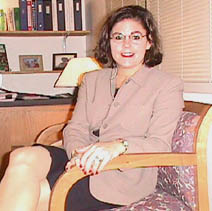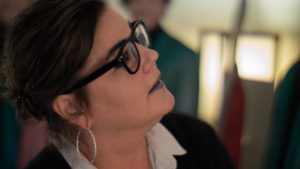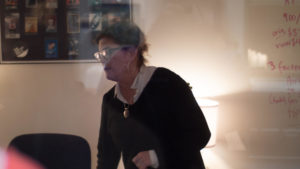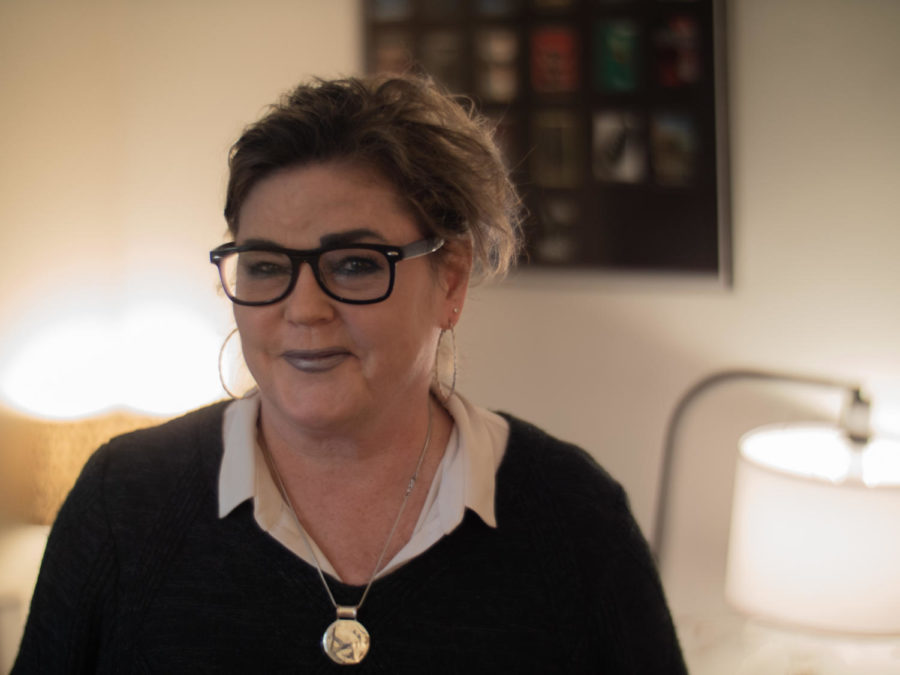“Love what you do” — An Interview with Dean Kari Conrad
April 1, 2022
The glass-walled offices of the CAP center — often hosting cardboard cutouts of the University’s latest celebrity guest peering out to the ELC’s student space — might only see a dozen students walk through its doors on any given day. What comes out of those doors, however, are experiences and memories tailor-made for students across the University.
I’ve had the opportunity to meet the boss there, Associate Dean of Students Kari Conrad, through our mutual time with Bucknell Student Government. She advises not only BSG, but also the Concert Committee, and she manages the CAP Center staff who run the Lectureship Committee, Outdoor Education and Leadership, clubs and organization support, makerspaces, student media and a variety of other areas. She’s worked with six University presidents and tens of thousands of students.
We spoke Tuesday about her experiences at the University, who she’s learned from and what students are looking for next.
I had arrived for the interview about 25 minutes early, and Dean Conrad walked in a few minutes after.
“Am I late?” she asked. She wasn’t, so she quickly finished a call with a talent agent before inviting me into her glass-walled office.
Opening the door, Dean Conrad said “my office is a complete nightmare” in her signature self-effacing style. (For the record, it really wasn’t.) We got started after she entreated me to have a coffee.
Hailing from Michigan, Dean Conrad got hired at the University in 1988. From her first job at California state school, a colleague sent her a job advertisement for Associate Director of Housing and Residential Life here at the University. Dean Conrad added, “I mean, again, the world was very different. No phones, no nothing, so he sent me an envelope.”
She applied for the job, “and then I get this call from a colleague that I was pretty close to.” Conrad accepted the University position after her colleague said “Well, I would be your boss.”
“And so,” Dean Conrad said, “it was meant to be.”
In Housing, she helped pick every single roommate combination for the hundreds of first-years. “We brought in seven chalkboards into a room, and we had every single student listed,” and circled the pairs individually, she said.
“It was all done by hand, so it was a slow, arduous kind of process,” she said.
After working for Housing for 11 years, Dean Conrad was twice invited to chair the search committee for a Campus Activities director. Twice, no candidate was hired, so her then-boss convinced her to take the job, “and it was the blessing of my life,” Dean Conrad said.
“Like, can you imagine coming into work every day and working with students in my capacity?” she said.
So, in 1999, Kari Conrad became Assistant Dean of Students, and began to lead the CAP Center. Soon, she’d adopt the title Dean Conrad, which nearly every student would shorten to affectionately call her “DC.”

Now, Dean Conrad describes her job as “half-and-half: students and interacting with them, and then making sure the infrastructure and administrative stuff is there to support whatever endeavors we do.”
“Students make a decision to come here because what they get inside the classroom is going to be second to none, right?” she said. “People are a little bit concerned when they come to Lewisburg, Pennsylvania about their out-of-class experience. So that’s our job: that’s what we have to attend to every single day.”
One of Dean Conrad’s main responsibilities is helping to advise the student Lectureship and Concert committees. Planning for international performers like Jack Harlow, Pete Davidson, Shaquille O’Neal and Kanye West in Lewisburg, Pa., according to her, takes a great deal of effort.
Even selecting people to invite proves challenging. “Did I know who Jack Harlow is? No. But once our students tell me ‘DC, he’s big, he’s awesome, he’ll rock it,’ that’s my job to dig a little deeper.”
Additionally, she helps to ensure that performers invited represent a diverse subset of the student body. “It’s my job to make sure it’s not the five students on concert committee leadership that are excited, or five people on the lectureship committee that are excited.”
“That’s my big thing,” she said, so that “the entire campus community is going to wrap their arms around it.”
When the choice of performer or their actions prove controversial, however, Dean Conrad is also there. “We do our best to mitigate those circumstances and to respect the community, and to respect the artist and their work and what the students want,” she says. “So it’s tough sometimes.”
Actually orchestrating the event is a whole different matter.
“Many of the artists are used to stadium concerts where it’s a well-oiled machine. We’re a college that does this once a year,” Dean Conrad said, “So this is not our everyday job.”
For instance, just last semester, “Shaq was so impressed; he just loved our student population. I would say that’s the sentiment of most people [who perform on campus],” Dean Conrad said.
While Dean Conrad said herself and other staff don’t actually see much face time with those invited, they do devote themselves to making the logistics go flawlessly. She cites facilities, dining and other University departments as making sure “our T’s are crossed and our I’s are dotted. So I think they really appreciate that.”
Dean Conrad advises several areas of Bucknell Student Government: in addition to the body overall, she specifically works with both the junior and senior class Senates, as well as the Community Committee.
She described being fortunate to have the chance to work with BSG and passionate students, because “the impact that student government and leaders and clubs and organizations have on campus, I don’t think anyone truly understands.”
For instance, “BSG finance is responsible for allocating half a million-plus dollars every year, so that’s huge,” she said.
“I’ve seen the impact BSG can have on campus,” Dean Conrad said. BSG students are important, she explained, not only because of the influence they have on their peers. “I think about political action, I think about activism. I think about dining policies and procedures.”
She continued that “Every nook and cranny of your out-of-class and in-class experiences has shifted and changed because of BSG, [and they] sit on a lot of powerful committees, Planning and Budget and [Committee on Instruction], so the influence and the opportunity for impact is right there in front of you.”
Students’ impact, according to Conrad, has made the University “a very different place than we were 20 years ago.”

But Dean Conrad made sure to contextualize her role: as students decide policy or discuss issues, “I try and remain incredibly quiet, because I do believe it’s student government. So I don’t chime in. I don’t give my opinion.”
She emphasized that she provides institutional history and an administrative perspective to those students, as well as warnings of “pitfalls or challenges that they might face.”
Ultimately, when students are deciding whether and how to get involved, “You’ve just got to feel powerful enough to use your voice when you’re on those committees, to make change.”
She pointed to two prominent alumni who both served on Bucknell Student Government: Erica Delsandro ’02, who is now an Assistant Professor of Women’s & Gender Studies here, and Jessica Jackley ’00, a prominent entrepreneur.
According to Dean Conrad, BSG is “a shortlist for strength,” and “all of those people who have profoundly impacted Bucknell in significant ways were a part of BSG, which is really cool.”
In the past, she said, BSG’s weekly meetings were often attended by students not in the organization, or by faculty and administrators looking to see what representatives were up to.
“My dream for the future of BSG is like, I would love Sunday meetings to be attended by outside groups and coming in and talking to BSG,” she said. “Our public comments exist for a reason, but no one ever takes advantage of that.”
“Ultimately, I truly believe in student government.”
On how the student body has changed during the time here, one thing Dean Conrad said remained constant is “their passion, their energy, their excitement, their positivity, their to multitask in so many different ways remains the same.”
But as the 2000s rolled onto the present day, “COVID and technology and social media has kind of raised the bar a little bit on anxiety, and shifting mental health is a huge thing right now. All of those challenges and those blessings come into play, as we deal with students now as compared to 20 years ago,” she said.
Conrad cracked more than a few jokes about Brent Papson, the Director of Campus Activities and Student Media, who reports directly to her.
“I mean, Brent constantly teases me about the fact that you know, when I came here, no computers, no cell phones, no nothing.” For instance, the University gave students their first email addresses eight years after Dean Conrad joined the University.
But moving towards a post-COVID world comes with its own unique set of challenges.
“Students are not as comfortable in face to face meetings, and having those real conversations with people,” Dean Conrad said, and challenging people online is a totally different experience. “You really don’t have the chance to unpack what that dialogue really meant.”
“So I say technology is good, and it’s challenging at times.”
So her department has adjusted programming accordingly: “Package programming, pop ups, all of that stuff. Let’s make some things really easy so students don’t have to jump through a million hoops to get a program done.”
Ultimately, Dean Conrad emphasized the value of face-to-face work as building the University community. It’s “getting people back around a table communicating, and having bonding activities and looking at each other without a mask for the first time this week, which is great. Feeling comfortable in large crowds, which they have not experienced in a long time.”
One of the favorite parts of Dean Conrad’s job is building relationships with students to have meaningful, authentic conversations.
“Whether I’m that Bucknell mom or that Bucknell friend or whatever, I want students to know that I learn from them, and I’m going to share my life experiences with them.”
She finds that those conversations continue to help her grow: “whether it’s political conversations, whether it’s conversations about home life, or life concerns or majors or ‘how do I do my job as BSG president’… just kind of unpacking life together, and just assuring them that that the conversations that we’re having are real and authentic, and that they can come to me.”
And she’s gained a lot here, too.
“I’ve been here for 34-plus years. I met my husband here. Three kids later, I mean, Bucknell is just a way of life for us.”
Dean Conrad’s kids “have had Bucknell babysitters, they’ve gone to concerts, they had BSG and CORE dinners, you know.” She added, “My daughter’s best friends with Chandler [Houldin]” who graduated in 2020 after being Executive President of BSG.
So the way DC has poured herself into the University has reflected on her kids. “They had certain things in mind when they went to college, but they also understand that you got to love what you do. Because you spend the majority of your life in your career and what you’re doing so, you know, love what you’re doing.”
As our conversation drew close to an hour, she offered some advice for both first-years and seniors.

“For a senior,” she continued, “maybe it’s time for some reflection. Most of our decisions in life are made in two seconds or less. But those really important decisions need reflection, right?”
Dean Conrad said seniors should ask themselves some questions. “Are you comfortable with your major? What are you looking for in your next step in life? What has your collegiate Bucknell experience meant to you and why? What are you taking away?”
“These four years you get once in your life, so maybe it’s time for some reflection at this point. And then move forward accordingly.”
To first-years, “Don’t feel like you’re a newbie on campus. You’ve got [only] four years to make this magic happen. So go for it. You know, ‘step in, paddle out,’ as Chandler would say, and do your magic,” she said. “Don’t be afraid to ask questions, to make waves, to — you know — be who you are.”
While I was putting the finishing touches on this article, DC and I ran into each other in the student space. I told her the photos I took just after our interview turned out great.
“Yeah, sure,” she quipped, and I started heading up towards class. DC had emailed me shortly before our interview and said “Feel free to bring a camera—although old people generally shy away from getting their picture taken.”
Carrying a poster for some upcoming campus event — I wasn’t able to tell — with an entourage of CAP Center peers, she stopped and yelled across the space: “Nick!”
I turned around. “See you Friday!” she said.
Canoe Battleship, 9 p.m. at Kinney. Rumor has it Brent Papson still has a spot open in his canoe.























Lauri Charlier Despard • Apr 4, 2022 at 8:36 am
One of the funniest and most REAL PEOPLE people person I’ve ever known…it’s not surprising the accreditations and accolades she’s earned. The article leaves out a critical piece of training: rooftop explorations of Ag Hall at Michigan State. GO GREEN, Kari.